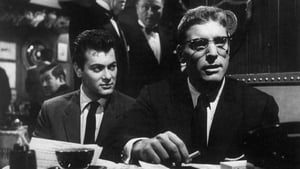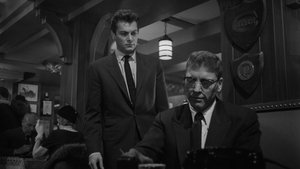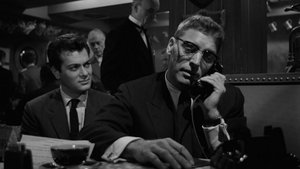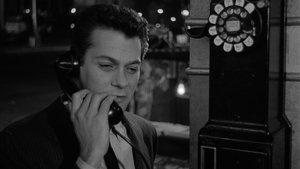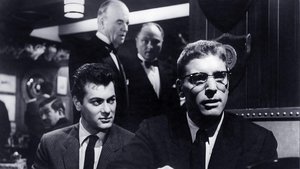Contact: info@alwanfilm.com
Video Sources 0 Views
- Watch trailer
- Sweet Smell of Success

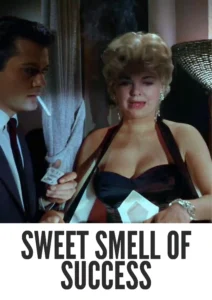
Sweet Smell of Success 1957 Colorized
Synopsis
Table of Contents
ToggleSweet Smell of Success 1957 Colorized Review

Introduction
In the annals of classic cinema, “Sweet Smell of Success” stands as a gritty, noir-infused masterpiece, capturing the essence of New York City’s cutthroat media landscape in the 1950s. However, the recent release of an early colored version of this iconic film has reignited discussions about the impact of colorization on cinematic classics. In this article, we delve into the world of “Sweet Smell of Success 1957,” exploring its director’s vision, the stellar cast, and the controversy surrounding its colorized release.
Check The Full Colorized Movies List
Check Our Colorized Movies Trailer Channel
Understanding Sweet Smell of Success 1957 Colorized Director, Cast, and Genre
Directed by Alexander Mackendrick, “Sweet Smell of Success” epitomizes the film noir genre with its sharp dialogue, atmospheric cinematography, and morally ambiguous characters. Mackendrick’s vision brings to life the seedy underbelly of New York’s entertainment industry, providing a captivating backdrop for the film’s narrative.
The film stars Burt Lancaster as the powerful and manipulative columnist J.J. Hunsecker, whose influence knows no bounds. Tony Curtis delivers a career-defining performance as Sidney Falco, a sycophantic press agent willing to do anything to curry favor with J.J. Hunsecker. Their tumultuous relationship forms the crux of the film, driving its tension and intrigue.
Exploring the World of Sweet Smell of Success 1957 Colorized: Plot and Characters
Set in the bustling streets of Manhattan, “Sweet Smell of Success” follows the Machiavellian machinations of J.J. Hunsecker and Sidney Falco as they navigate the murky waters of tabloid journalism. J.J. enlists Sidney’s help to sabotage the romance between his sister, Susan, and a jazz musician named Steve Dallas. As Sidney delves deeper into J.J.’s world, he finds himself ensnared in a web of deceit and betrayal, leading to devastating consequences for all involved.
The characters in “Sweet Smell of Success” are morally ambiguous, reflecting the amorality of the world they inhabit. J.J. Hunsecker is a domineering figure, using his influence to manipulate others for his own gain. Sidney Falco, on the other hand, is a desperate opportunist, willing to sacrifice his integrity to climb the social ladder. Their complex relationship is fraught with tension and power struggles, driving the film’s narrative forward with relentless intensity.
The Art of Film Colorization
Film colorization is a controversial process that involves digitally adding color to black and white films. While some argue that colorization breathes new life into old classics, others believe it detracts from the original artistic vision of the filmmakers. The process has evolved over the years, with advancements in technology allowing for more precise colorization techniques.
Early Colored Films: A Brief History
The history of colorization dates back to the early days of cinema, with filmmakers experimenting with hand-painted frames to add color to their films. However, it wasn’t until the advent of Technicolor in the 1930s that color films became commercially viable. Technicolor revolutionized the industry, allowing filmmakers to capture vibrant hues on screen with unprecedented clarity.
Sweet Smell of Success 1957 and Its Early Colored Version
In a bold move, the producers of “Sweet Smell of Success” decided to release an early colored version of the film, hoping to attract a new generation of viewers. While purists may balk at the idea of tampering with a classic, the colorized version offers a fresh perspective on the film’s visual aesthetic. The lush color palette adds depth and richness to the film’s atmospheric cinematography, breathing new life into its iconic scenes.
The Debate Over Film Colorization
The debate over film colorization rages on, with proponents arguing that it allows audiences to experience classic films in a new light, while opponents contend that it undermines the artistic integrity of the original work. Ultimately, the decision to colorize a film is a subjective one, with filmmakers and audiences alike weighing the pros and cons of the process.
Examining Sweet Smell of Success 1957 as an Early Colored Film
As with any colorized classic, the question remains: does the addition of color enhance or detract from the viewing experience? In the case of “Sweet Smell of Success 1957,” the early colored version offers a fresh perspective on the film’s visual aesthetic, adding depth and dimension to its atmospheric cinematography. While purists may prefer the original black and white version, the colorized edition provides a unique opportunity to experience the film in a new way.
Influence and Legacy: Sweet Smell of Success 1957 Colorizeds Impact on Cinema
“Sweet Smell of Success 1957” has left an indelible mark on the world of cinema, inspiring countless filmmakers and influencing the evolution of the film noir genre. Its themes of power, corruption, and moral ambiguity continue to resonate with audiences to this day, cementing its status as a timeless classic.
Director’s Cinematic Legacy: Beyond Sweet Smell of Success 1957 Colorized
Alexander Mackendrick’s contributions to cinema extend far beyond “Sweet Smell of Success 1957.” As a pioneering filmmaker, Mackendrick’s innovative storytelling techniques and bold visual style have left an indelible mark on the medium, inspiring future generations of filmmakers to push the boundaries of cinematic expression.
Themes Explored in Sweet Smell of Success 1957 Colorized
“Sweet Smell of Success 1957” delves into dark and gritty themes, exploring the underbelly of New York’s media landscape with unflinching honesty. Its portrayal of power dynamics, corruption, and moral compromise remains as relevant today as it did upon its initial release, making it a timeless exploration of the human condition.
Reception and Controversy Surrounding Sweet Smell of Success 1957 Colorized
Upon its release, “Sweet Smell of Success 1957” received critical acclaim for its gripping storyline, stellar performances, and atmospheric cinematography. However, the decision to release an early colored version of the film has sparked controversy among purists, who argue that it undermines the integrity of the original work. Despite the debate, the film continues to be celebrated as a cinematic masterpiece, standing the test of time as a quintessential example of film noir.
Where to Watch Sweet Smell of Success 1957 Colorized Online
For those eager to experience the allure of “Sweet Smell of Success 1957,” the film is readily available on popular streaming platforms such as Amazon Prime, iTunes, and Google Play. Whether watching in its original black and white format or the early colored version, audiences are sure to be captivated by the film’s timeless storytelling and unforgettable performances.
FAQs About Sweet Smell of Success 1957 Colorized
- Q: Is “Sweet Smell of Success 1957” based on a true story?
- A: While the film is not directly based on a true story, it draws inspiration from the real-life experiences of tabloid journalists in 1950s New York City.
- Q: Who composed the iconic score for “Sweet Smell of Success 1957”?
- A: The film’s haunting score was composed by Elmer Bernstein, adding to its atmospheric ambiance and tension.
- Q: Are there any notable differences between the original black and white version and the early colored version of “Sweet Smell of Success 1957”?
- A: While the overall storyline remains the same, the early colored version offers a visually enhanced experience, with vibrant hues and richer textures.
Conclusion
In conclusion, “Sweet Smell of Success 1957” remains a cinematic tour de force, captivating audiences with its gripping narrative, stellar performances, and atmospheric cinematography. Whether viewed in its original black and white format or the early colored version, the film continues to resonate with viewers, offering a timeless exploration of power, corruption, and moral compromise. While the debate over film colorization may persist, one thing remains certain: the enduring legacy of “Sweet Smell of Success 1957” is a testament to its status as a cinematic classic for the ages. So, whether you’re a seasoned cinephile or a newcomer to the world of classic cinema, be sure to experience the allure of “Sweet Smell of Success 1957” for yourself, and discover why it remains an essential entry in the pantheon of cinematic masterpieces.
